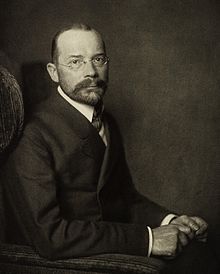You can help expand this article with text translated from the corresponding article in German. (March 2021) Click for important translation instructions.
|
| Wilhelm His Jr. | |
|---|---|
 | |
| Born | (1863-12-29)29 December 1863 Basel, Switzerland |
| Died | 10 November 1934(1934-11-10) (aged 70) Brombach [de] near Lörrach, Germany |
| Known for | Bundle of His |
Wilhelm His Jr. (29 December 1863 – 10 November 1934) was a Swiss cardiologist and anatomist, son of Wilhelm His Sr.
In 1893, His discovered the bundle of His, the collection of specialized cardiac muscle cells in the heart that transmits electrical impulses and helps synchronize contraction of the cardiac muscles. Later in life, as a professor of medicine at the University of Berlin, he was one of the first to recognize that "the heartbeat has its origin in the individual cells of heart muscle."
Werner–His disease (or trench fever) was also named after him.
Angle of His (or incisura cardiaca) was posthumously named after him by Daniel John Cunningham in 1906.
Works
- Die Front der Ärzte . Velhagen & Klasing, Bielefeld 1931 Digital edition by the University and State Library Düsseldorf
References
- Turk, R. P. (2006). "The History of Surgery for Hiatal Hernia and Gastroesophageal Reflux" (PDF). Springer. Retrieved 2019-04-09.
External links
This article about a German person in the field of medicine is a stub. You can help Misplaced Pages by expanding it. |